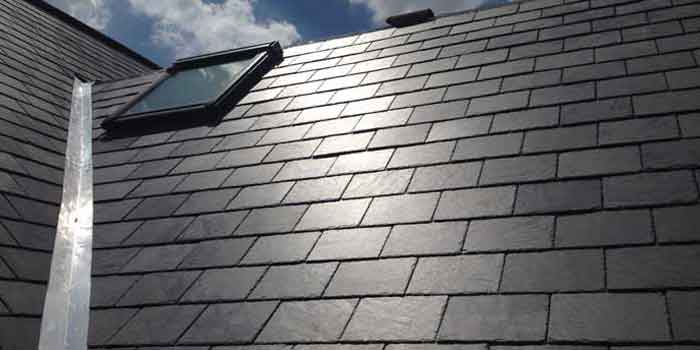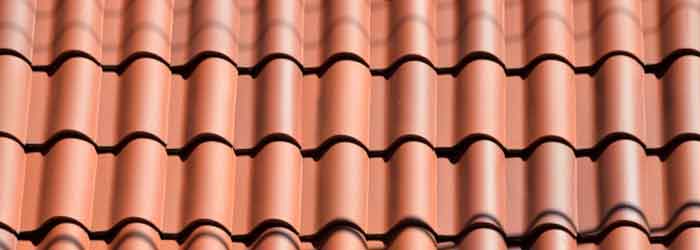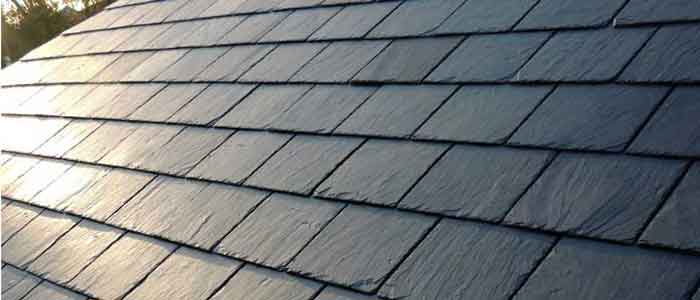There are a large selection of roof tiles types for your home so which should you choose? Some have different lifespans while others need regular maintenance. Getting the type of tiles right is important for the design and aesthetic look of your home. Most common roof types are suitable for tiles, they can also be used as a flat roofing material and on floors.

Which Types Of Roof Tiles Should You Choose?
Clay tiles are popular thanks to the variety of colours and finishes available. Slate tiles also come in different shades and from different parts of the world. Concrete and metal tiles are also popular options worth considering. It often depends on what style of roof you have when selecting your tiles to install.
Below we touch on some of the main roof tiles types with the benefits and drawbacks of each. We will also provide information about pricing and commons uses.
Clay Tiles
Clay roof tiles are still one of the leading options when it comes to your roof. This material is so durable that we are still finding traces from thousands of years ago. One of the most pleasing things with Clay is the variety of beautiful finishes. This can make a a big difference to the aesthetic look and value of your home.

Clay is the tile of choice right across the Mediterranean which is the look many want in the UK. These tiles tend to preserve their colour for around 50 years at least. They are much lighter than concrete tiles and have a lower absorption rate as well. Clay roof tiles are more expensive than concrete tiles and a pitch of at least 15° is necessary.
Slate Tiles
Slate is another popular roof tile type which comes in many different styles. This material is like Clay which offers a beautiful aesthetic finish. Slate is common for both roofs and floor thanks to it’s authentic look.

Natural Slate is the most common material but there are several other types. Spanish Slate, Welsh Slate and Man-Made Slate are among the top options. Slate tiles tend to be more expensive than Clay or Concrete. They are also easier to break during installation due to their brittle nature.
Slate tiles can have a lifespan of up to 150 years but it will be depend on the quality. Some will have a much shorter lifespan so it’s a good idea to do some research first. You tend to see Slate used a lot more on listed buildings and conservation areas.
Concrete Roofing Tiles
Concrete tiles are the most cost effective option for your roof tiles. Forming this tile material is a combination of sand, cement and water. It’s possible to generate the same aesthetic look and style as other tiles such as Clay. Concrete tiles are much heavier than either Clay or Slate which can put more stress on the structure.
The hard nature of Concrete makes this material impervious to extreme weather conditions. Most companies will guarantee your tiles up to 30 years but they should last much longer. You do not tend to see Concrete tiles for listed buildings and conservation areas like Clay or Slate.
Some of the best quality tiles include Marley Concrete tiles which can generate a classic finish. It’s important to note that you will usually need a roof pitch of 22.5° for most Concrete tiles. There are however some modern tiles that are suitable for lower roof pitches.]
Metal Tiles
Metal roof tiles are gaining in popularity currently for several reasons. Although they are metal tiles, they weigh far less than Clay or Concrete. This can be ideal if you are looking for a lightweight solution. Another key advantage is metal will often last longer, up to 60 years in some cases.
Metal roof tiles usually come in strips instead of singular tiles like other materials. This can have a big impact on the installation time so your roof could be ready quicker. It’s possible to create many unique designs with metal which can appear authentic. The one slight disadvantage with these tiles is they tend to cost more than other types. This is also the case with sheets, the top metals such as Zinc roofing and Copper are among the pricier options.
Lightweight Roof Tiles
Lightweight roof tiles are the latest rage for roof tiles types which have many benefits. The most obvious to most will be that they are lighter than other tiles. Clay, Slate and Concrete classify as the heavyweight tiles category. This means they weigh over 20 kg per square metre.
Lightweight roof tiles are all the types of tiles that weigh less than 20 kg per square metre. This includes most Metal, synthetic Slate and Plastic tiles along with shingles. You can usually install most tile types in sections as opposed to singular. This helps to cut down the installation time and also the cost in some cases. Another benefit is most lightweight tiles only need a roof pitch of 5 degrees.
Other Common Roof Tiles Types
Above we touch of some of the top roof tiles types but there are other different formats. Below are a few of the most common in use for British homes.
- Interlocking roof tiles are one of the most common tile types in the UK. These tend to result in a reduction in installation time. This tile format usually comes in Concrete but is also available in Clay and Slate.
- Low pitch roof tiles are suitable for roofs that have a pitch of under 20°. This tile type is most common in Clay and Concrete and also have an interlocking system.
- Pantiles is another popular tile type which comes in Clay and Concrete. The introduction of Concrete is a lot more recent to give a cost effective option. These tiles comes with the distinctive “S” finish which is striking.
